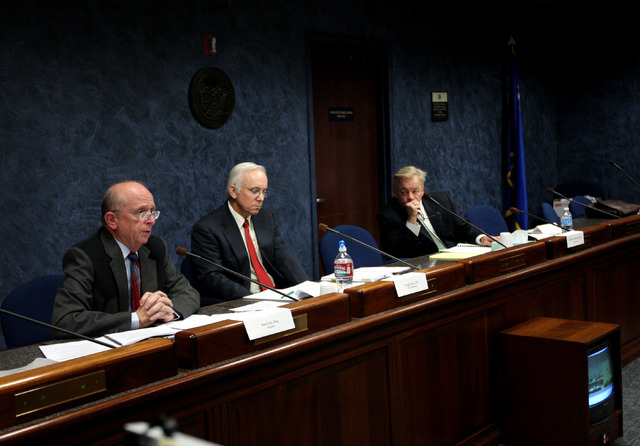What a difference a word could make
NEWPORT BEACH, Calif. — The Nevada Ethics Commission is considering a change to state law that might affect whether public officials are subjected to fines and other sanctions, the commission’s executive director confirmed on Saturday.
Speaking after a panel at the State Bar of Nevada’s annual meeting, Caren Cafferata-Jenkins said the commission may seek to change a single word in a state statute that would allow the commission greater discretion in deciding whether an ethics law violation was “willful,” and thus subject to heightened penalties.
Currently, state law says the commission “shall” consider a number of factors in determining whether a violation on the part of a public official was willful, which the law defines as a situation where a public officer or employee under the commission’s jurisdiction “acted intentionally and knowingly.”
Those items include the seriousness of the violation, the number of times that official had been warned in the past about ethics violations, the cost to the commission of investigating the violation, mitigating factors (including whether the official reported himself or herself, promptly corrected the problem and cooperated with the commission in its investigation), restitution or reimbursement paid and whether the official profited from the violation.
But, according to commission counsel Yvonne Nevarez-Goodson, the practical effect of the law makes finding willful violations difficult. “It’s been almost impossible to find a willful violation at this point,” Nevarez-Goodson said.
As a result, Cafferata-Jenkins said the commission may recommend the Legislature consider changing the word “shall,” to the word “may,” which would allow but not require the commission to review the list of mitigating factors when determining whether a violation is willful. That would make it easier to find a violation was willful, a finding that allows the commission to levy fines and even initiate proceedings to remove wayward officials from office.
Jenkins declined to elaborate on the change, however, saying it was still being drafted for inclusion in the package of bills the governor will ultimately recommend to the Legislature.
However, during the State Bar panel, she said the commission is less interested in fines and punishment, and more interested in educating public officials about good ethical practice and following ethics laws. “We would rather teach than catch,” Cafferata-Jenkins said. “Administrative agencies are very approachable, especially the Ethics Commission.”
Requests to the commission for advice on particular situations are confidential, which Jenkins likened to asking for a map of a minefield before stepping blindly into it. Investigations are conducted more informally than many other state agencies, with the goal of identifying what happened rather than fixing blame. And those investigations are also confidential until they’re complete, she said.
“We are never going to see the light of day unless there’s some ‘there’ there,” she said.
Despite that approach, the commission is seeing an increase in legal challenges to its authority, motions to head off investigations and other legal barriers. “Our processes are being innundated with legal process,” Nevarez-Goodson said. The phenomenon is dubbed “lawyering up,” and its one of the reasons the commission has a backlog in its requests for opinions.
On the other hand, public officials who ask for and receive advice from a government lawyer before doing something that is later found to be a violation have a “safe harbor” from being accused of a willful violation.
“We’ve seen some officials throw the public attorney under the bus,” Cafferata-Jenkins said. She said another legal change that may be sought at the 2015 Legislature would be to require substantial evidence that a public official acted in good faith to honestly describe the situation to the government attorney, and then followed that person’s advice in order to take advantage of the “safe harbor” provision. She also recommended that government attorneys put their advice in writing so a record exists if a complaint is filed.
In a recent case, members of the Clark County School District Board of Trustees admitted to having violated ethics lawswhen they directed assistants to use district email to send information about a capital bond campaign to volunteers. The members told the Ethics Commission they relied on the advice of a district lawyer.
Cafferata-Jenkins and Nevarez-Goodson spoke on the final day of the State Bar of Nevada’s annual meeting. Next year’s gathering will take place in Seattle.














